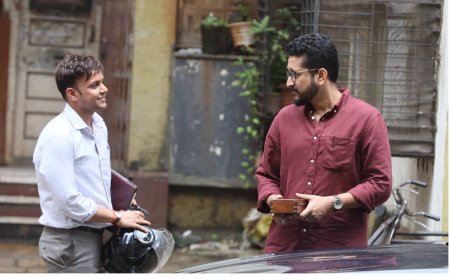IRADA - THE ONLY BOLLYWOOD FILM ON ECO-TERRORISM
A Retro-Review

Dr. Shoma A. Chatterji, a distinguished Indian film scholar and author, writes about Irada, a Hindi film, which is currently being streamed on an OTT site.
Do you know that India has a “cancer train” running through Malwa to Bikaner, Rajasthan, called the Abohar-Jodhpur Express is so named because its patients, from small children to old people, are cancer patients travelling to get treatment? Other passengers are ‘salesmen’ selling blood of different groups in plastic sachets to those who wish to buy blood and also, dubious insurance agents trying to barter with a dying patient to sign on an insurance form for the benefit of the surviving family as “his days are really numbered”. I had not the slightest clue about all this before I watched a film that came and went without as much as a whimper.
Irada, a Hindi film released way back in 2017, is a very under-valued film though its subject matter is perhaps more significant than the film itself. Bollywood and the larger canvas of pan-Indian national cinema has perhaps not touched this subject before or after Irada, through which the young Aparnaa Singh makes her directorial debut. Though her directorial wand still has to acquire finesse, it must have taken a lot of courage for her to dig deep into the world of eco-terrorism.

Image: film still
"Eco-terrorism" is used to denote the use or threatened use of violence of a criminal nature against innocent victims or property by an environmentally oriented subnational group for environmental-political reasons, aimed at an audience beyond the target, and often of a symbolic nature. Irada, after a touching story of a middle-aged man who loses his talented daughter of blood cancer and how he avenges her death, zeroes in on Bathinda where the over- usage of pesticides in agricultural practices, concentration of uranium in water and use of tobacco and alcohol etc. are considered as important factors for the prominence of cancer in the region. According to a newspaper report published on February 11, 2022, “On an average, five to seven cancer patients die of cancer every year in Chathewala village of Bathinda, situated at the tail-end of Talwandi Sabo block, for the past many years. Of around 500 families in this village, over 150 are afflicted with the deadly disease.” Careless use of chemicals including fertilizers, pesticides, etc.in vegetable, crop, and fruit cultivation was leading to the high concentration of deposits of chemicals in the bodies and several studies have proved that excess intake or use of certain chemicals could cause cancer according to cancer specialists.
But this film is different. The focus shifts from a story of grief of losing a gifted only child suffered by the grieving father to the causes that led to the sudden and quick death of this budding champion swimmer of blood cancer. The father, a retired and much decorated defense officer, is hell-bent on investigating into the causes of his daughter’s death but is stopped every now and then. The infection is sourced back to the uranium and other poisonous chemicals found in the water of the swimming pool. The young journalist who first began to investigate the story is “taken care of” by the young industrialist (Sharad Kelkar) who owns and runs the chemical factories in the region, carries the corrupt CM of the state (Divya Dutta) in his pocket as he is the main funder of her projects and gleefully carries on with the illegal act of reverse boring which releases the entire chemical wastes back into the water much below the ground level, resulting in the poisoning of the water leading to cancer when used plentifully by local people. He also has his men organize manipulated blood donation campaigns to gain mileage from the CM but why he does this and how is not explained at all.
The story of the film is interesting. But the telling of the story is a bit jumbled, confused and ambivalent. In a quaint town in Bhatinda, Punjab, Prarabjeet Walia, a retired Indian army official (Naseeruddin Shah) wakes up every morning at 5:30 am to train his daughter in swimming. Father and daughter run, seldom speak, but share a bond as the training sessions unfold. She – beautiful, determined, and athletic – follows every target her father sets. Some days it’s 200 metres in less than two minutes; some days it’s less. Each morning, she diligently practices in a local water body. Her aspiration, and her father’s is for her to join the Indian Air Force. Then, a training session becomes tragic when she nearly drowns. A few tests later, the two are greeted with the dreaded C-word and the stage is pretty advanced. When she is rejected by the Air Force she begins to battle her own demons out loud. He does the same in silence. This opening scene of Irada sets the tone for the rest of the film – an unsettling two hours of the reality in Punjab, the cancer capital of India.
Just a few days before her death, head shaved, body half its original size, sick and white and weak, she vents out her quiet anger at her father. She says, “I tried to be the son you must have desired. I tried to live entirely by your time-bound discipline. But after I fell ill, I realized that I am a woman and wanted to be loved by a man which will never happen. I want to live but I cannot. I was living your life, not mine.” This is one of the most tragic scenes in the film enriched by the magnificent performance of the young girl who portrays the cancer victim. Another touching scene is when she chops off her lustrous hair and looks at her reflection in the mirror preparing herself for the long and painful curative routine. But the most touching scene is when Arrjun gets into the “cancer train” and is shocked when a little boy with a shaved head says, “I have cancer, please keep away from me or you will catch it too” in a very matter-of-fact way.
The diagnosis of Walia’s daughter is followed by a series of bomb blasts at a chemical factory owned by Bhatinda’s richest tycoon. It is suspected to have been manipulated which is true. An NIA officer Arrjun Misra (Arshad Warsi) is recruited to investigate the case but stumbles upon something murkier and even more poisonous. The officer channels what he calls his “inner-Singham” and takes down these powerful, sketchy characters, otherwise known as politicians and businessmen. Sagarika Ghatge is Maya, the journalist girlfriend of the slain journalist, tries to reveal the secrets to Arrjun Misra but he is not interested.
Co-produced by Falguni Patel and Prince Soni, Irada stars Naseeruddin Shah, Arshad Warsi, Divya Dutta, Sharad Kelkar, and Sagarika Ghatge in the pivotal roles. Rajesh Sharma as the industrialist’s right hand man is very good too. However, Maya’s character is superfluous and neither adds not subtracts from the story. Divya Dutt gives a brilliant performance as the Punjabi-accented, rude, arrogant and merciless CM while Sharad Kelkar is given rather short shrift. The bar scene with the song-dance number is also unwarranted. The song sequence introduced between the lover pair of Maya and her boyfriend dilutes the significance of the message and is needless.
The editing is good but the script is too loosely written and fails to tie up several loose ends right through the film. Why Arrjun behaves so rudely with Maya is not explained. Why and how Walia’s tragic death is faked by Arrjun also remains a mystery and the same applies to the real man who died in the manufactured blast. As a result of focusing on how Walia follows up on his daughter’s demise and pounces on the truth, the focus on cancer resulting from the reverse boring which releases dangerous chemicals like Uranium waste into the ground water and below is slightly marginalized.
But these are no reasons for the film being washed away into oblivion for want of funds for marketing and publicity while many very bad films are making it to the screens grandly never mind that they are miserable flops or reasonable successes. The fact remains that Irada is really a very significant film and the only feature film from Bollywood that explores the dangerous subject of eco-terrorism.
***
What's Your Reaction?


































































